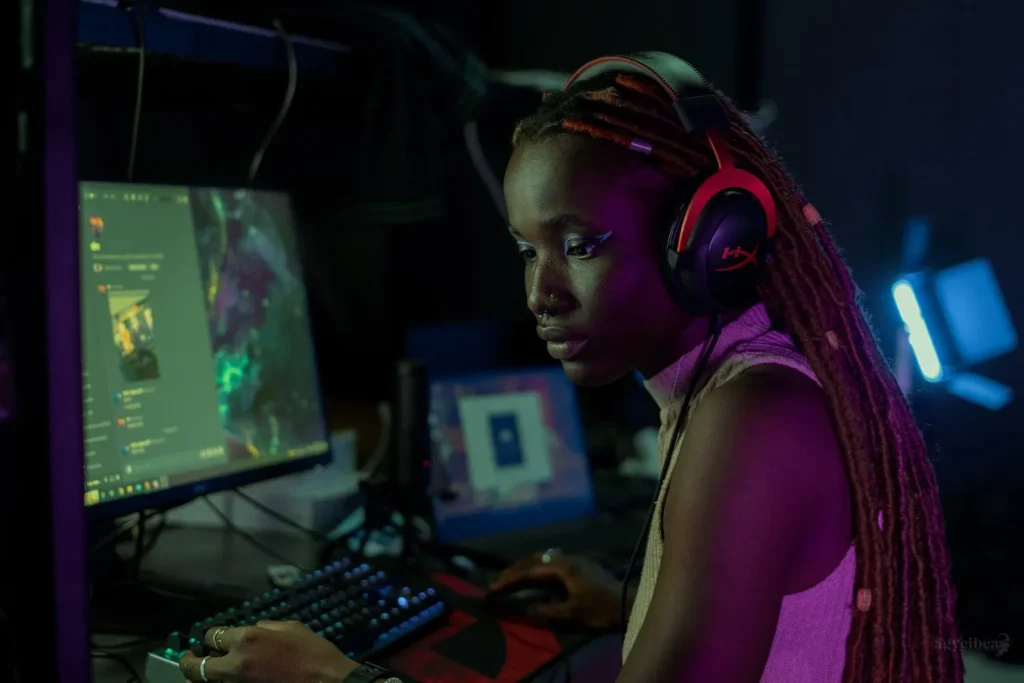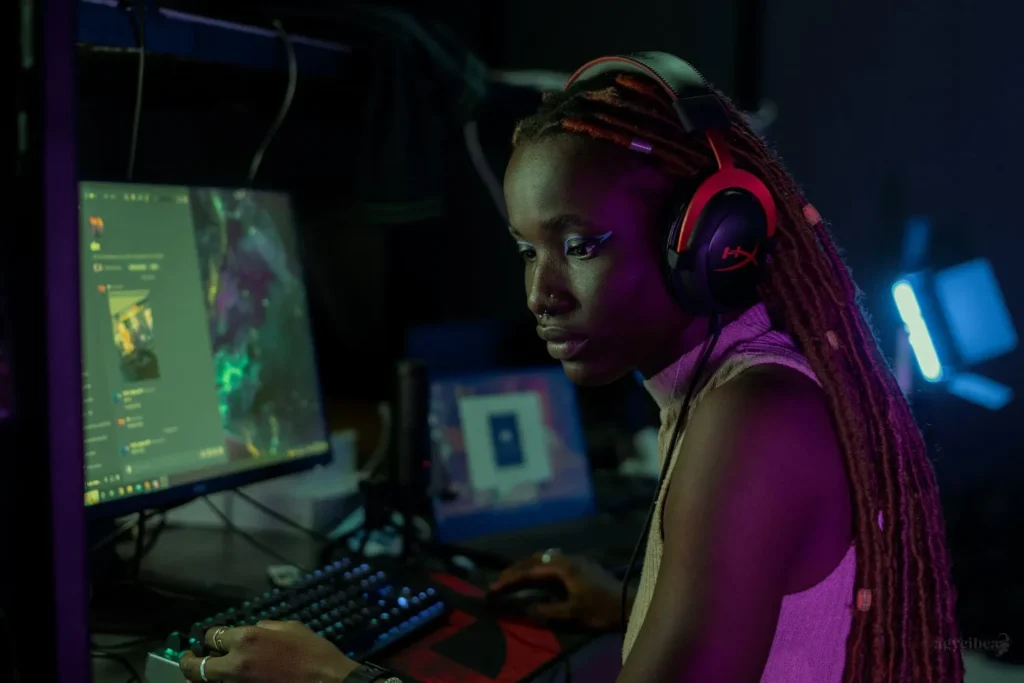- In October 1972, at the height of the Bronze Age of technology, Standford Artificial Intelligence Lab hosted the first-ever Esports Tournament.
- Nigeria hosted the first African Games for Esports in 2020, hosting over 300 players in Lagos.
- In 2018, esports revenue was $856 million, and according to Statista, its projected market will reach $1,624 million by the end of the year.
Africa’s digital transformation has ushered in a new era of innovations and opportunities for ordinary people. Technology is steadily reshaping Africa’s economy, from digital currency and e-learning to Agritech. During the decade of transition, a few countries have stood at the top, each struggling for the title of Africa’s tech hub; Kenya, South Africa and Ghana.
Fortunately, innovations coincided with a vision for change in one particular Industry and an African country. Recently the rise of Nigeria’s gaming industry gave leeway to a sport that serves as a measure of financial freedom for most Nigerian youths; Esports gaming. Play-To-Earn games have taken root in the West African country, paving the way for a new economic activity.
The History of Esports
Esports, or electronic sports, is a concept that has recently taken root worldwide. Unfortunately, the gaming industry first introduced the idea of sports tournaments and games back in the 90s when the era of classical video games redefined the capabilities of technology.
Initially, the concept of competitive computer games dates back to the 1950s. At the time, Alexander Shato Douglas published a thesis on the interaction between humans and computers. He would later develop one of the earliest computer games through Tic-Tac-Toe. Despite the game’s limitations, it opened up the very first iteration of the gaming industry, which led to the development of the first multiplayer game in 1958, Tennis for Two.
The primary gaming industry concept in the 50s led to Esports tournaments. This eventually trickled down to the creation of Play-to-Earn games. In October 1972, at the height of the Bronze Age of technology, Standford Artificial Intelligence Lab hosted the first-ever Esports Tournament that rippled throughout the gaming industry.
Read: African real estate market is an investor’s goldmine.
Despite its mundane graphics and capabilities, it unclocked the floodgates of possibilities for the gaming industry. It highlights the limitless potential that computers could have only hindered by the creativity o their developers. In hindsight, the gaming industry was the first practical evidence of a virtual world which would later lead to the development of the Metaverse.
The 80s marked the complete iteration of Esports.
During the 80s, developers took the fundamental aspect of the gaming industry and developed two machines; Astroid and Starfire. These inventions enabled gamers to immortalize themselves on scoreboards. It marked a significant milestone due to the limited number of devices that allowed real-time Esports.
The development of a recording mechanism urged payers from around the globe to participate actively in the games. For instance, Space Invaders recorded over 10,000 games actively competing to win its grand prize.
The innovations of the first iterations of the Esports industry soon took a turn in the 2000s with the Internet. The idea of the gaming industry and the sophistication of developers soon became apparent that Esports presented a once-in-a-lifetime opportunity for a new form of earning.

In 2003, the first Electronic Sports World Cup was played in Poitiers, France. Its massive turn-up and viewer rate led to the CPL World Tour. The CPL became the first sports tournament with a grand prize of one million dollars. Clock two decades later, Esport led to the development of Play-To-Earn games.
Furthermore, the gaming industry played a significant role in various filed such as AI, Virtual reality and Digital Currency. Now the gaming industry has ushered in a new front for Africa, causing the rise of Esports in Nigeria.
Esports in Nigeria takes root.
Nigeria is known for its rapid implementation of new digital innovations. It was the first country to adopt CBDC and is one of the most promising countries regarding cryptocurrency. Many experts believe Nigeria might be the most likely contender for Africa’s Tech Hub title. Thus, it is no shock that Esports in Nigeria is gaining a worldwide view.
Read: Tanzania’s gaming industry keeps soaring.
Since the gaming industry is a fast-growing form of entertainment, many Nigerians have sought its lucrative potential for some time now. Over the past few decades, enterprenuers and gamers have collaborated locally and internationally to host several sports events in Nigeria.
First-ever Esports in Africa
On a continental level, the country hosted the first African Games for Esports in 2020, hosting over 300 players in Lagos. At the time, the AGE partnered with the Nigerian government to establish a firm stand on the country’s gaming industry.
The tournament hosted a prize pool of $500,000 pulled from sponsors. Despite Covid 19 ravaging the continent, it did not stop nor slow down the tournament. The event marked a significant milestone for Esports in Nigeria. It created a platform for skilled African players to compete and showed alternative ways of earning money.
In addition, the Counter-Strike tournament was also another attempt to promote Esports in Nigeria. Due to its interconnective nature, it pooled hundreds of Africans, aiming to win the top prize. The gradual rise of the Nigerian gaming industry is also the main reason for establishing the African Gaming League in 2016. Amaete Umanah founded the organization in 2016 to host and develop Esports events in Nigeria.

The calibre of its citizen’s skills in the gaming industry soon gained a global audience. Multiple gaming industries each picture in to see if they could promote their products within Africa. Its success led to the development of the Nigeria ESports Championship, the country’s first official esports League.
The NESC is responsible for a series of gaming initiatives that have brought in multiple investors, developers and gamers from within and outside the country.
The potential of Esports in Nigeria.
From an economic viewpoint, Esports events serve from a strategic angle for the economy of Nigerians and its organizations. In 2018, esports revenue was $856 million, and according to Statista, its projected market will reach $1,624 million by the end of the year.
Furthermore, given Nigeria’s widespread love for Esports, other countries such as South Africa and Kenya have entered the franchise. With the rapid growth rate of the continent’s digital transformation, the market will have an annual growth rate f 8.31%, reaching a volume of $2,235 million.
Read: Cameroonians out to make a kill as AFCON kicks off.
The concept has led to the development of Play-To-Earn games within the continent. Typically, they are a scaled version of sports tournaments that allow players to earn digital currency or game tokens, which users can exchange for fiat currency. Due to this, multiple Africans have dived into the digital world to find an alternative form of income.
Furthermore, the notion of Play-To-Earn games has increased demand for developers within the country. In 2022, Nigeria’s gaming industry recorded a 33% adoption increase in Play-to-Earn games. According to Fider’s NFT Gaming Adoption report, Nigeria ranks 9th globally for Play-to-Earn Adoption. In hindsight, the rise of Esports in Nigeria has played a significant role in their statists.
As Africa embraces new technology, such as AI and blockchain, most industries have a digital footprint. This means that most enterprises will opt for a digital ecosystem rendering most mundane jobs obsolete. This realization has egged most developers and entrepreneurs to seek a more digitally-based form of earning.
Due to the easy-nature, rapidly growing and lucrative approach Esport in Nigeria has offered, it comes as no surprise most citizens would opt for it. It provides a better solution, and most organizations within Nigeria’s gaming industry offer rewards in dollars. In doing so, it gives more valued currency to its citizens, similar to the fintech and crypto industries.
Given the better pay and adventurous world of the gaming industry, it’s only a matter of time before the entry of Africa adapts sports events.


